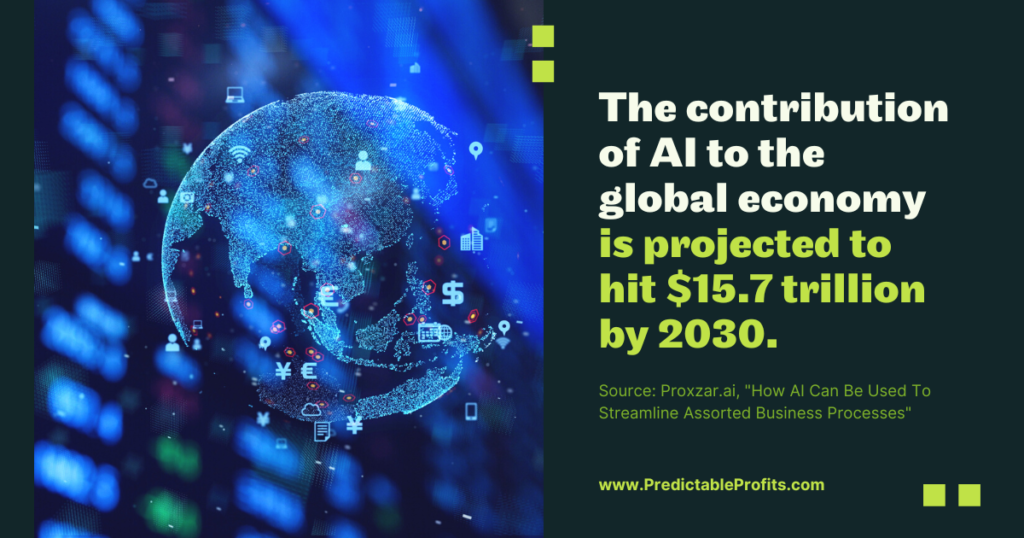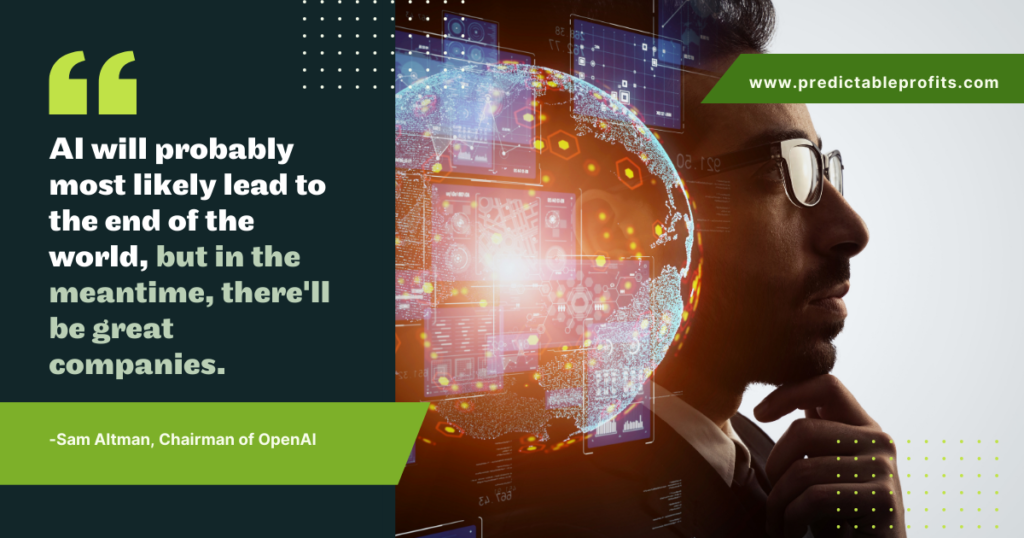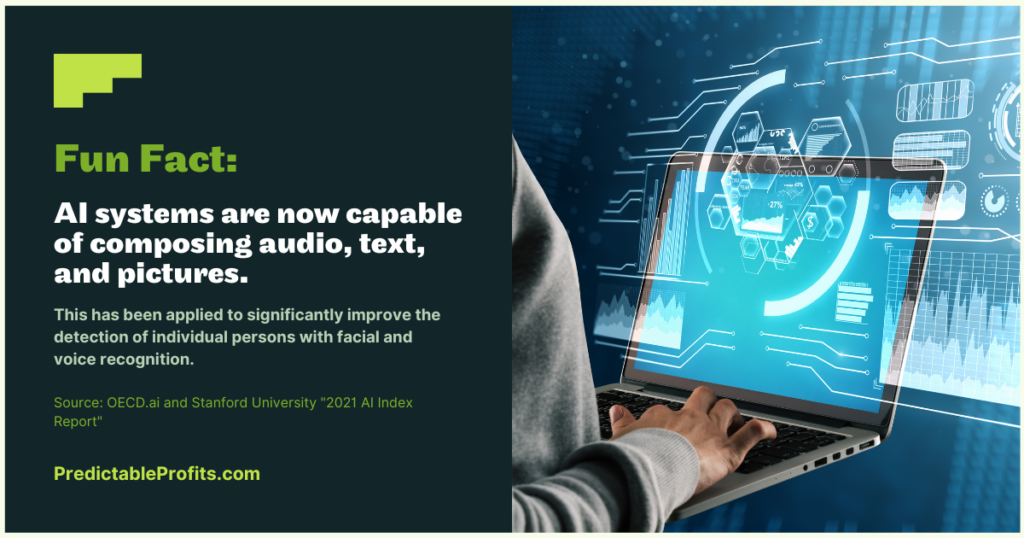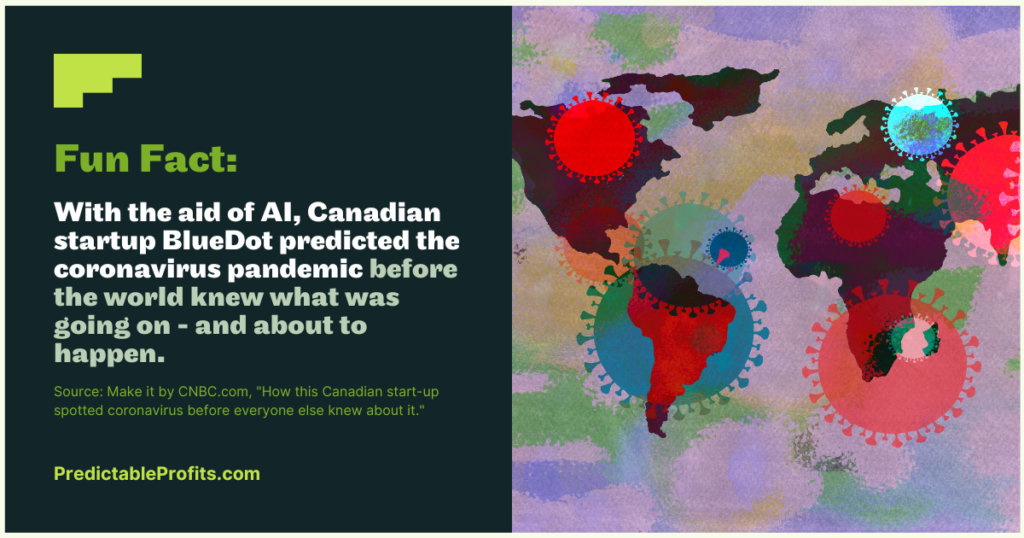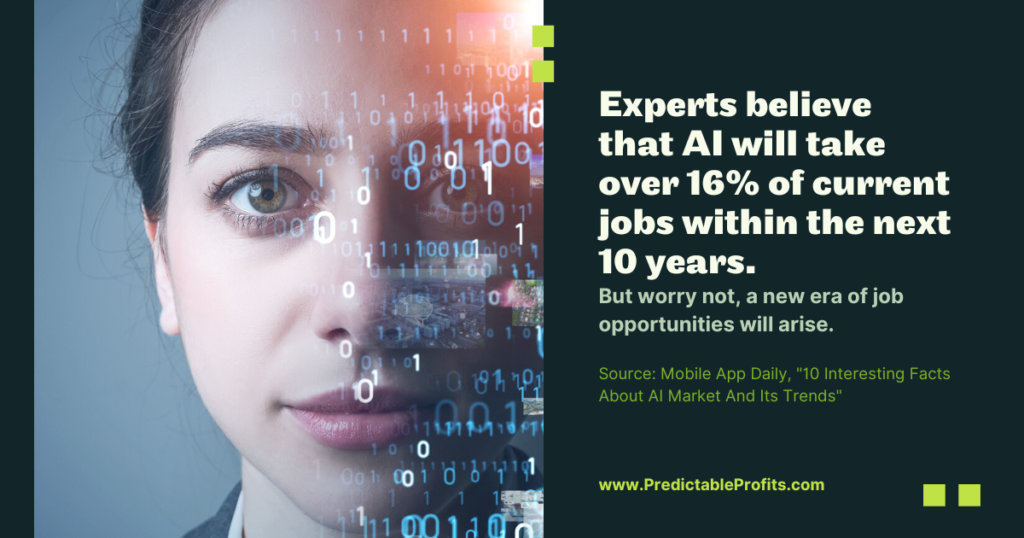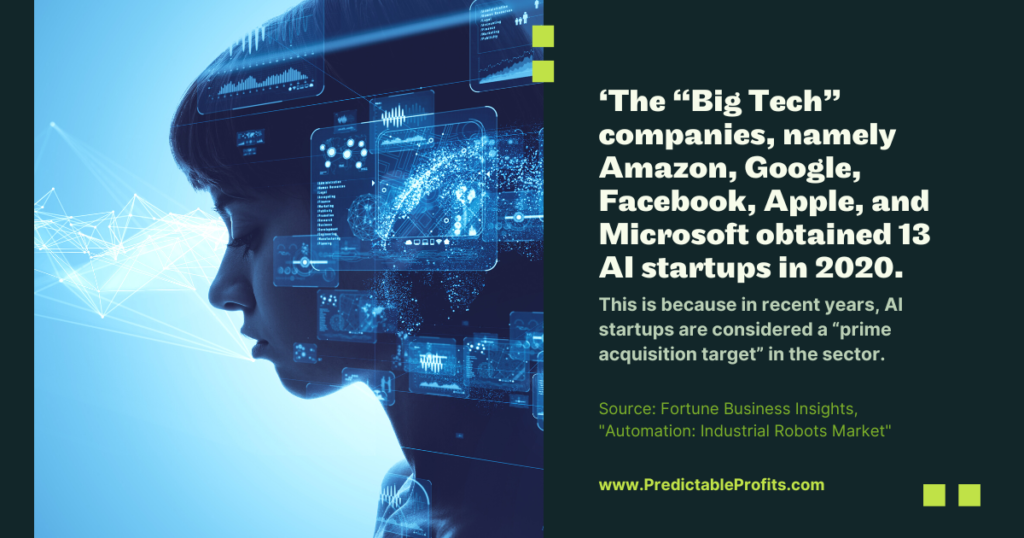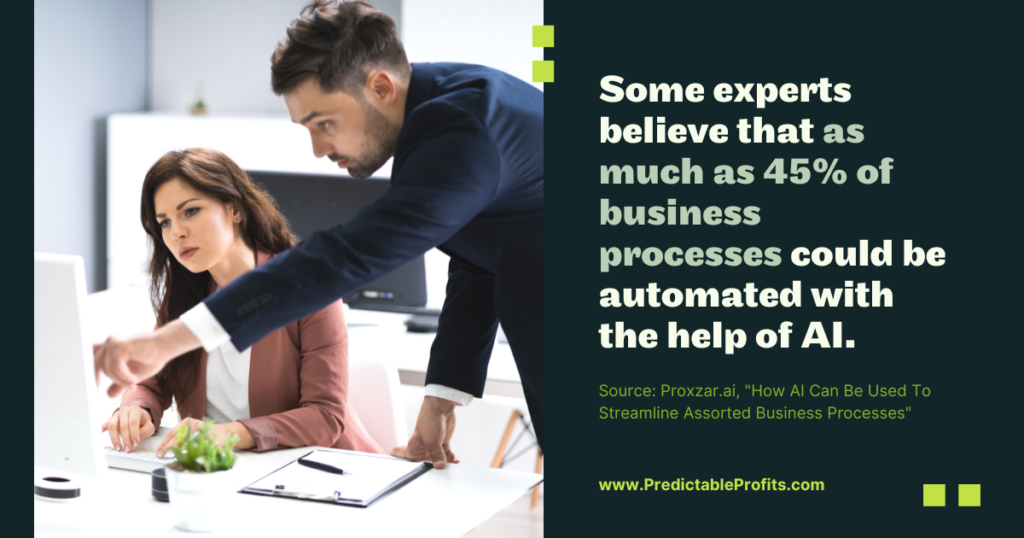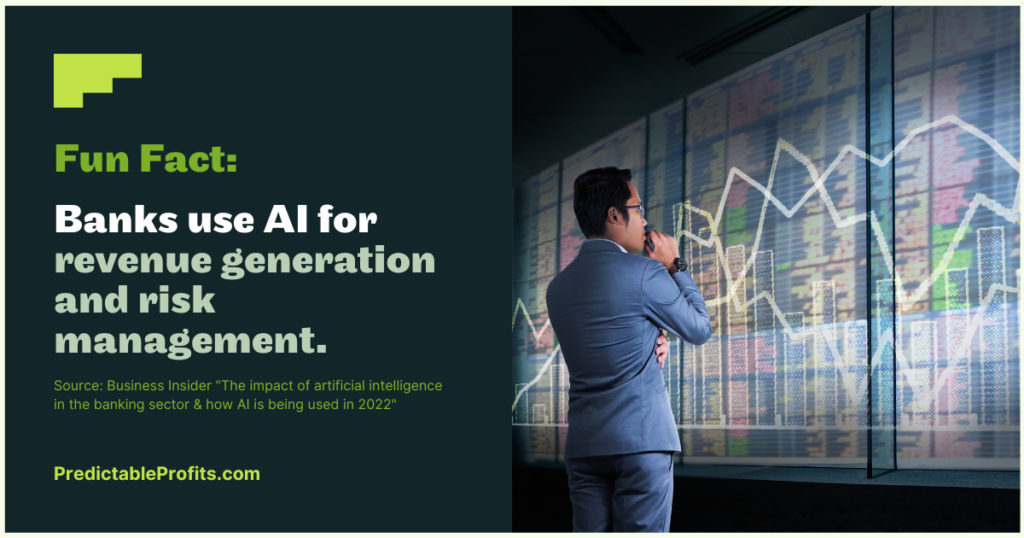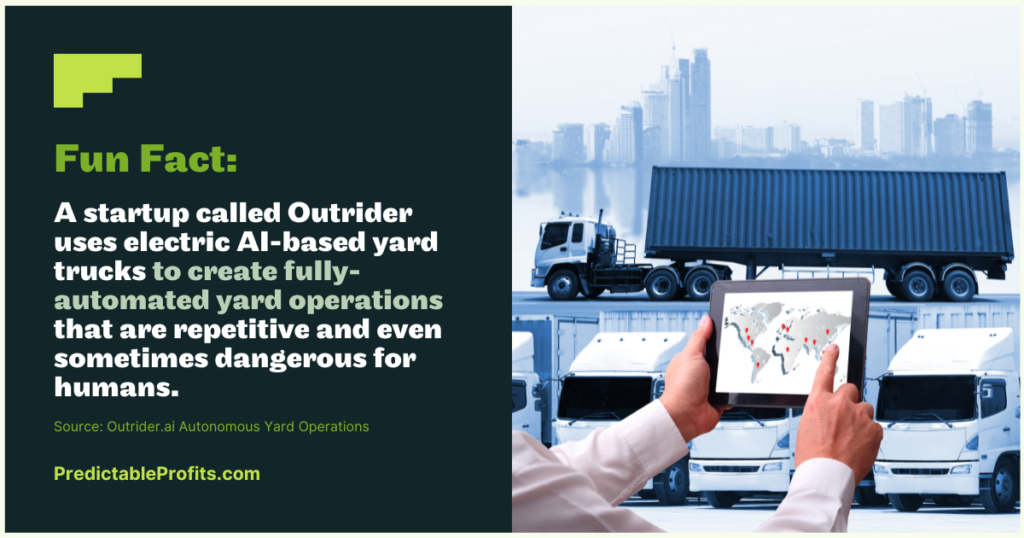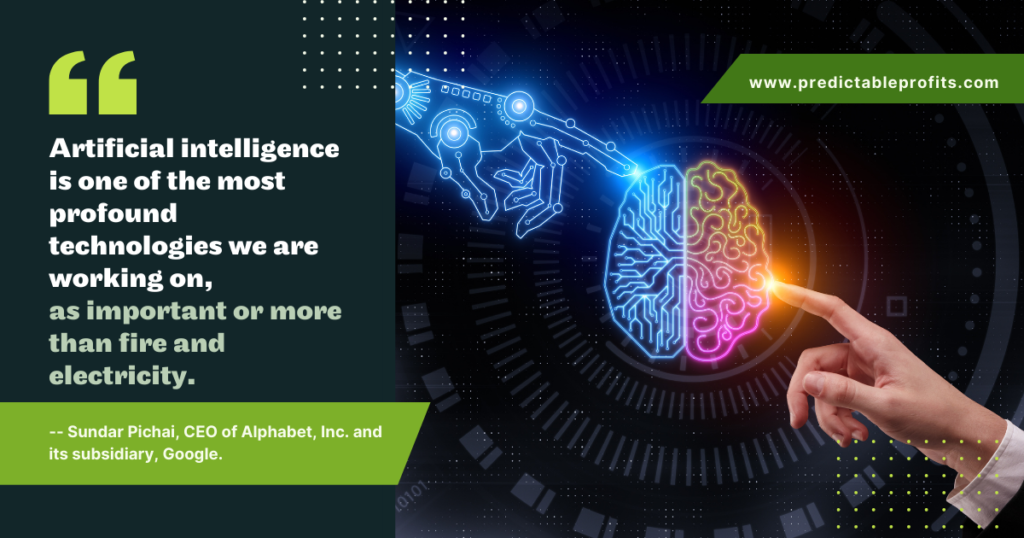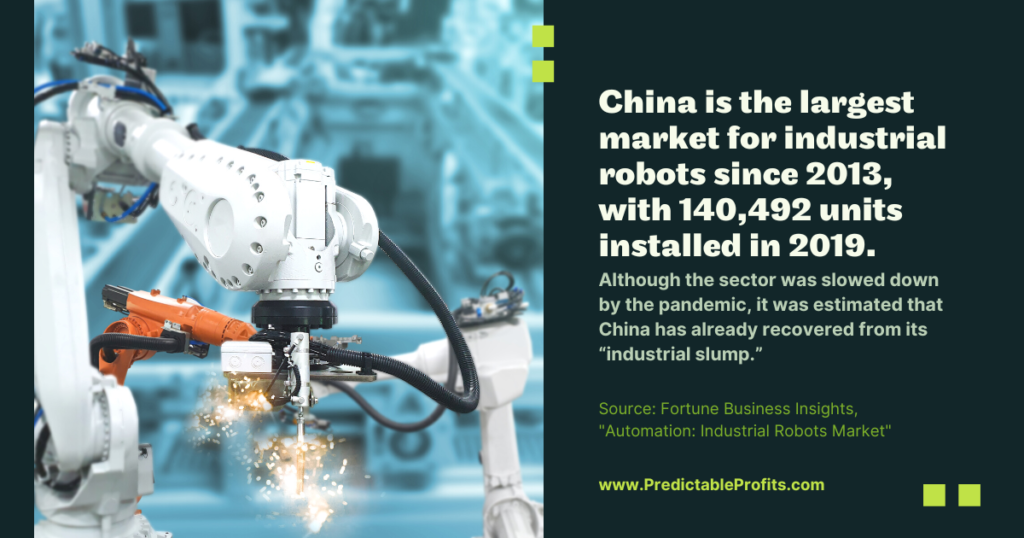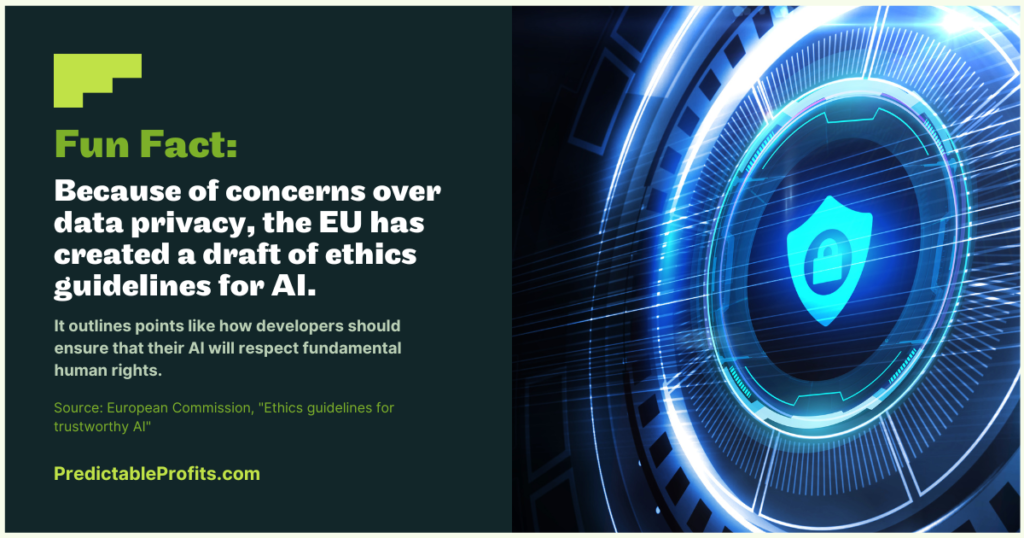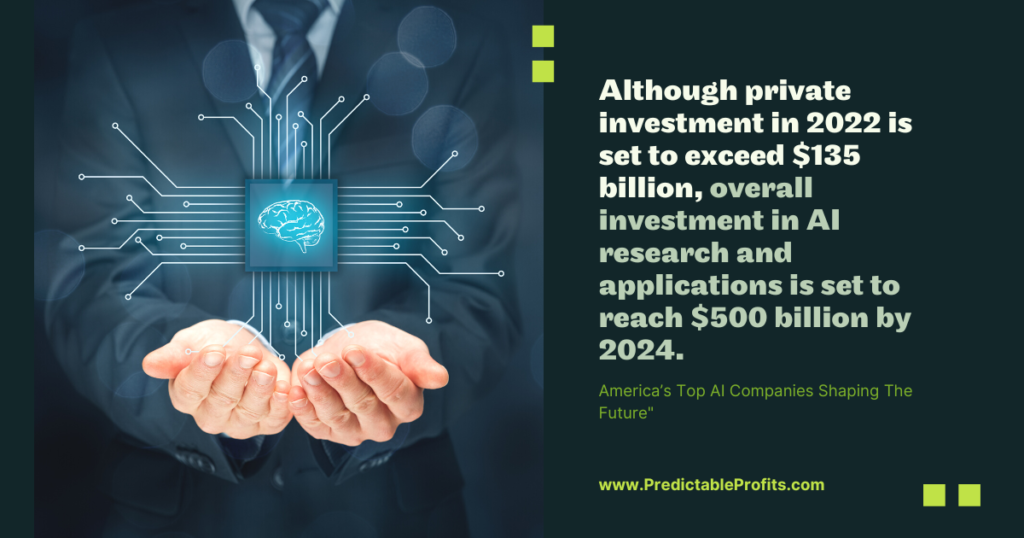As technology advances and the impact of AI becomes increasingly evident, businesses must be aware of the potential implications of artificial intelligence for the future.
AI will clearly revolutionize how we work, bringing automation, efficiency, and cost savings to many sectors. However, AI can also bring disruption. If companies don’t keep up with the latest trends and advancements, they could quickly find themselves left behind in a rapidly changing landscape.
The contribution of AI to the global economy is projected to hit $15.7 trillion by 2030. AI is seen by many as an engine of productivity and economic growth, and is expected to drive greater product enhancements and improvements in consumer demand. (Source)
On November 30, 2022, the world changed with the launch of ChatGPT. This free artificial intelligence tool allows anyone to converse with a generative pre-trained robot.
ChatGPT reached a million users in just five days, making it the fastest-growing platform in history. This rapid growth surpasses the achievements of social media giants such as Facebook, Instagram, and Pinterest, as well as the popular game Angry Birds, which took 35 days to reach a million users.
The impact of AI is disrupting industries such as healthcare, law, journalism, aerospace, and manufacturing. Artificial intelligence has the potential to revolutionize these same industries by analyzing and processing large amounts of data quickly, bringing new levels of efficiency to many business systems — from improved customer service to automated processes.
For example, AI enables medical practitioners to access accurate and relevant patient data through predictive analytics. AI is also used in transportation, particularly in developing self-driving cars.
In the ever-evolving world of technology, artificial intelligence is quickly becoming an essential tool for businesses looking to stay competitive.
Organizations must understand AI’s impact to avoid missing out on lucrative opportunities or getting left behind in a rapidly changing landscape.
Sam Altman, Chairman of OpenAI, once joked, “AI will probably most likely lead to the end of the world, but in the meantime, there’ll be great companies.”
What is Artificial Intelligence About (and Why is it Such a Huge Deal)?
Artificial Intelligence is the process of using computers and software to replicate human thought processes.
With the help of AI, machines can now understand and respond to voice commands, recognize objects in images, and even identify trends in large data sets.
This technology has vast implications for businesses, with automated customer service bots and analysis systems that help identify opportunities for improvement.
In short, AI allows you to think smarter, faster, and more accurately than ever before – making it an incredibly useful tool for businesses looking to stay competitive in an ever-evolving digital world.
ChatGPT makes AI accessible to everyone.
ChatGPT revolutionized the world of artificial intelligence by making it accessible to everyone. The platform offers a wide range of features, including natural language processing, sentiment analysis, and more — all of which are available at no cost.
This innovation has opened up a new world of possibilities for businesses and consumers alike, giving them unprecedented access to cutting-edge AI technology.
Thanks to ChatGPT, businesses can now employ powerful AI-based tools without breaking their budgets — making AI an invaluable asset in any business’ arsenal.
AI systems are now capable of composing audio, text, and pictures. This has been applied to significantly improve the detection of individual persons with facial and voice recognition. AI is also being used to create more personalized customer experiences by leveraging natural language processing and machine learning to better understand customer needs. (Source)
There are other AI tools out there.
Innovation in the field of artificial intelligence is booming — and ChatGPT is just the beginning. Companies are introducing more and more AI tools to give businesses an edge.
While ChatGPT may have been the first to make AI more accessible, there are now countless other powerful platforms out there.
From automated customer service bots and natural language processing systems to sentiment analysis and facial recognition, these AI tools can help companies run smoother operations and stay one step ahead of the competition.
With so many options available, ChatGPT is just the beginning of a new age of AI-driven business solutions reshaping the way we do business.
The Impact of AI on Key Industries
Did you know that a Canadian AI-powered startup, BlueDot, predicted the coronavirus pandemic before the world knew what was going on – and about to happen? BlueDot’s proprietary machine-learning algorithms detected credible threats posed by the virus nine days before the World Health Organization (WHO) issued its official announcement. (Source)
As artificial intelligence continues to evolve and become more powerful, many industries are likely to experience disruption from AI in the coming years.
These include:
- Healthcare
- Agriculture
- Transportation
- Customer service
- Banking and financial services
- Logistics
- Marketing
- Retail
- IT Service Management
- Cybersecurity
- Manufacturing
- Journalism
- Law
- Energy & mining
- Lifestyle
- Defense
Let’s briefly dive into each one:
1. Healthcare
Artificial intelligence is transforming the healthcare industry in numerous ways. The potential for AI in healthcare is endless, from chatbots that help patients with health diagnoses to robots that can perform surgery with precision.
Currently, AI is used in the healthcare sector to identify high-risk patient groups, predict diseases, and increase the speed and accuracy of treatment. It is also implemented to automate diagnostic tests and improve drug formulations.
Using AI in predictive care and DNA analysis has the potential to improve the quality of healthcare significantly and have a positive impact on people’s lives.
Aetheon’s TUG robot can carry nearly 1000 lbs of medication to any location in a hospital, freeing up doctors to spend more time with patients. The robot’s autonomous navigation capabilities reduce the time it takes to deliver medications, which can be crucial in emergencies. Additionally, the TUG robot’s safety features ensure that medications are delivered safely and securely. (Source)
2. Agriculture
Deploying AI solutions in agriculture has the potential to increase efficiency, reduce costs, and improve crop yields. It is an exciting industry development that could significantly affect food production and distribution globally.
AI is used in agriculture to track crops and soil conditions and optimize irrigation and fertilization. By collecting data on factors such as temperature, humidity, and soil nutrient levels, AI can support farmers in making informed decisions about how to care for their crops.
Agriculture also uses predictive analytics to forecast market trends and optimize production. This can help farmers make strategic decisions about what crops to plant and when to plant to maximize profits.
Experts predict that within the next 10 years, AI will impact 16% of current jobs, leaving many people worried about their future employment prospects. However, these advancements in AI also open new job opportunities in various fields, such as software engineering, data science, food production, energy, and so much more. (Source)
3. Transportation
Autonomous driving technology is revolutionizing how we travel and transport goods. Companies such as Tesla, Waymo, and Uber have already introduced autonomous vehicles to the mainstream world, with Google also joining the fray by creating self-driving technology.
These cars have sensors and AI algorithms that give them unprecedented safety and fuel efficiency on the road.
Additionally, they provide greater comfort to passengers through personalization features such as automatic temperature control and music streaming.
Autonomous driving technology also offers improved accuracy and reliability, providing greater safety when compared to a human driver. It also lets vehicles detect hazardous situations earlier than a human driver, minimizing accident risks.
With its ability to effectively navigate complex traffic scenarios, take immediate action in hazardous situations, and optimize routes for fuel efficiency, autonomous driving can be used as an effective tool to revolutionize the transportation industry.
In 2020, companies such as Amazon, Google, Facebook, Apple, and Microsoft, commonly called “Big Tech”, acquired 13 AI startups. This is due to the fact that in recent years, AI startups have become highly sought-after acquisition targets in the industry. (Source)
4. Call Centers & Customer Service
AI is disrupting the call center industry with chatbots and automated messaging. These technologies can potentially improve customer service and experience, as they can listen to calls and analyze their impact on customer behavior.
In the future, AI-driven calls may even improve customer satisfaction and loyalty by smoothing over potential problems.
While there is concern that AI could make call centers obsolete, it is more likely these technologies will get integrated into the industry to enhance the services provided.
AI has the potential to revolutionize various business processes. According to experts, up to 45% of business operations could potentially be automated using AI, resulting in increased efficiency, cost-savings, and improved data-driven decision-making. The impact of AI could have wide-ranging ramifications across various industries, such as enabling faster and more accurate analysis of large data sets, automating repetitive tasks, and enabling real-time monitoring of business performance. (Source)
5. Banking & Financial Services
AI has the potential to significantly enhance and improve the financial sector, particularly through its ability to analyze and process large amounts of data.
In the banking industry, AI can detect fraudulent transactions, automate tedious manual processes such as paperwork and documentation, and identify high-value customers through predictive analytics.
Additionally, AI can help banks retain customers by providing personalized services based on customer spending and financial activities and predict the likelihood of an individual defaulting on a loan during onboarding.
These applications of AI can not only streamline operations and improve customer service, but also reduce the risk of financial loss.
Financial institutions are increasingly utilizing AI technology to improve their revenue generation and risk management strategies. Banks are also leveraging AI tools to detect fraudulent activities and comply with regulatory requirements, leading to more efficient and secure operations. (Source)
6. Logistics
AI has the potential to significantly impact the logistics industry by optimizing operations and streamlining processes.
Predictive analytics can forecast inventory needs and optimize delivery routes to reduce overhead costs. For example, Ab InBev, a global beverage distributor, has applied AI to predict demand and optimize production, reducing warehousing expenses.
Shipping companies can also benefit from using AI by implementing image recognition algorithms and intelligent automation at customs stations to speed up document checks and reduce time spent at ports.
The global shipping industry has begun adopting AI, particularly predictive analytics, to optimize supply chain efficiency.
Outrider, a startup company, has developed a cutting-edge solution to revolutionize yard operations. They use electric, AI-powered trucks that work towards creating fully-automated yards. These AI-controlled vehicles are able to navigate yards with precision, move cargo safely and efficiently, and communicate with other systems to optimize operations. (Source)
7. Marketing
The marketing industry is quickly embracing the power of AI to revolutionize personalized messaging and target audiences more effectively.
With the help of intelligent automation and AI-based tools, businesses can create more relevant content tailored to specific audiences. These tools also enable companies to optimize campaigns, analyze customer data, and segment customers according to interests and preferences.
Advertisements are becoming more and more accurate. Platforms such as Google and Facebook can use AI algorithms to focus on specific audiences, while recommendation engines provide personalization based on a user’s history and interests.
This allows companies to create more relevant ads that can capture users’ attention, resulting in greater ROI for businesses.
As AI continues to grow in popularity, it will open up even more possibilities for businesses in the marketing space.
According to Sundar Pichai, CEO of Alphabet, Inc. and its subsidiary, Google: “Artificial intelligence is one of the most profound technologies we are working on, as important or more than fire and electricity. Developing important new technology … for humankind, it’s always been about balancing the positives and the negatives and harnessing it to make sure it benefits society.”
8. Retail
AI is revolutionizing the retail industry through analytics and automation. Retailers use AI to optimize supply chains and predict customer demand, as well as arrange products according to customer preferences.
Self-shop stores, such as Amazon Go, use AI technologies like machine learning, deep learning, image recognition, and smart automation to enable customers to purchase products easily without checkouts or cashiers.
In the online marketplace, Amazon uses retail analytics to predict similar products for customers and maximize sales.
Adopting AI in retail improves efficiency, increases sales, and transforms the shopping experience.
9. IT Service Management
AI and automation is also gaining traction in the IT service management (ITSM) space.
With its ability to automate Point-of-Entry processes, provide self-service for low-tier incidents, and deliver optimized organization and instant information such as meeting schedules through personal assistants, AI helps companies reduce recurring losses, enhance organization, and improve overall technology use in both homes and workplaces.
“Machine learning allows us to build software solutions that exceed human understanding and shows us how AI can innervate every industry” says Steve Jurvetson, a Board Member of SpaceX and Tesla.
10. Cybersecurity
AI has the potential to revolutionize the field of cybersecurity by working with large databases of past attacks and malware to detect and prevent future threats.
Antivirus companies already use AI to defend against cyberattacks proactively. By training AI algorithms to recognize patterns and anomalies, companies can implement continuous monitoring solutions that quickly identify and fix vulnerabilities or alert human handlers to potential issues.
Additionally, AI can help detect long-term cyberattacks on high-profile targets, such as multinational enterprises, earlier, minimizing damage and protecting against financial and data losses.
11. Manufacturing
The adoption of AI in manufacturing has the potential to greatly improve efficiency, reduce costs, and increase competitiveness in the industry.
One way that it is doing this is through using predictive maintenance. By collecting data on equipment performance and usage, AI algorithms can predict when a machine is likely to fail or require maintenance. This allows manufacturers to schedule maintenance in advance, reducing downtime and improving efficiency.
Another application of AI in manufacturing is in the optimization of production processes. By analyzing data on production output, machine performance, and other factors, AI can help manufacturers identify bottlenecks and inefficiencies in their processes and suggest ways to improve them. This can result in increased production speeds and decreased production costs.
Additionally, AI is being used to improve product quality through machine-learning algorithms that can identify defects in real-time and alert operators to take corrective action. This helps reduce the number of defective products and improves customer satisfaction.
Since 2013, China has been the biggest market for industrial robots, with 140,492 units installed in 2019 alone. The industry did slow down due to the pandemic, but it is believed that China has already regained its footing and recovered from the “industrial slump.” (Source)
12. Journalism
With the advent of AI-powered tools, journalists can analyze large volumes of data and identify previously undetectable patterns. This allows them to write more accurate and in-depth articles and also uncover hidden stories and trends.
AI is also used to automate certain aspects of the journalism process. For example, AI-powered software can generate articles based on predetermined parameters. This allows journalists to focus on more complex stories while the software handles routine tasks.
However, there are concerns that AI will eventually replace human journalists, leading to job losses and decreased journalistic quality. To counter this, journalists must adapt to the changing landscape and embrace AI’s benefits while still maintaining the integrity and ethics of their profession.
13. Law
While using AI in law raises ethical questions, it has the potential to streamline and improve legal processes.
For example, AI quickly and accurately reviews and analyzes large amounts of legal documents, such as contracts. This can save time and resources, allowing lawyers to focus on higher-value tasks.
AI can also predict the outcomes of cases based on previous legal decisions, helping lawyers to strategize better and prepare for cases.
Additionally, AI can assist with legal research by quickly finding relevant information and cases.
“Some people call this artificial intelligence, but the reality is this technology will enhance us. So instead of artificial intelligence, I think we’ll augment our intelligence,” says Ginni Rometty, CEO of IBM.
14. Energy & Mining
Implementing AI into smart electric grids could revolutionize the energy industry. Using AI technology enables more efficient energy delivery, greater predictive capabilities, and better cost-effectiveness in energy exploration.
Business giants such as General Electric use AI to optimize electricity flow from batteries and points of consumption, with Bloomberg News reporting that this could generate $200 billion in global savings.
By leveraging the power of AI within the energy industry, companies can find new ways to make savings while also creating more innovative and efficient grids for consumers.
15. Lifestyle
AI has also led to several lifestyle changes, such as smart homes and integrated living.
Devices such as Google Home, the Roomba, and Amazon Alexa have become popular, and chatbots might see more representation in the coming years across industries.
Such devices already see widespread use among the general public. Along with the rise of the internet of things, predictive algorithms can enable an automated way of living for adopters.
For example, a fridge can use image recognition algorithms to detect if it is running low on vegetables. It can then place an order at a nearby grocery store and deliver the groceries to the user’s doorstep through a robot.
This method of living will extend into an everyday household undertaking. Moreover, the overall disruption brought about by AI will fundamentally change life as we know it.
The impact of AI on romance and relationships: Artificial intelligence is poised to play a significant role in the future of dating apps. Researchers believe that AI technology will allow individuals to find more suitable partners with greater ease, all through the convenience of their smartphones. (Source)
16. Defense and Security
Even though the advancement of autonomous weapons is regulated heavily, the defense sector is sure to develop with the amount of capital being poured into it.
Ethical consequences of creating autonomous weapons have also been considered, but AI-powered weapons are said to be indicative of the next arms race.
Besides autonomous weapons, image and video recognition may be used to surveil the general population.
By building upon existing databases with biometric and facial scans, a citizen can be identified using facial recognition algorithms in surveillance networks. This increases the nation’s general security while reducing human intervention.
Ethical discussions about using technology have also emerged, as it can be misused to enforce an authoritarian style of rule.
Such technology has already seen deployment in China, where widespread facial recognition algorithms are used to create a social credit system. Citizens are graded, based on their actions, which are logged using AI-based cameras.
The impact of AI on data privacy: the European Union has created a draft of ethics guidelines for AI. It outlines points like how developers should guarantee that their AI creations will respect fundamental human rights. (Source)
Change is Here. And it's Time to Embrace it.
The impact of AI on business is clear: as adoption of artificial intelligence increases, this technology has the potential to revolutionize a wide range of industries.
AI has the power to reshape industries through improved automation and analytics capabilities, as well as uncover new revenue sources.
By leveraging advancements in AI, you can gain a competitive edge by improving efficiency, accuracy, and productivity across all departments of an organization.
With AI technology, you can make better-informed decisions, leading to greater success while benefiting from cost savings. Investing in AI solutions can be a smart move for any business looking toward the future — so why not make the most of it today?
Despite the significant level of private investment in AI expected to reach over $135 billion in 2022, industry experts predict that the overall investment in AI research and development as well as deployment across various sectors is projected to reach even higher levels, around $500 billion, by the year 2024. (Source)
Conclusion: A Final Word on the Impact of AI on Different Industries
The future of artificial intelligence is already here, and it is essential for individuals and organizations to adapt to this new reality. AI represents a significant opportunity for individuals and organizations to drive innovation, stay competitive and create new opportunities for growth.
AI technology will continue to advance and shape the world. With its potential for solving complex problems, it is a powerful tool that could greatly improve how organizations operate across all industries.
Companies that embrace AI technologies and use them strategically can gain competitive advantages.
AI can help improve your organization’s efficiency, accuracy, and productivity while also saving time and money. The future of AI is bright, and we can all look forward to the opportunities it brings in the years to come.
If you are ready to take advantage of this technology, now is the perfect time to invest in AI solutions or even start a new business leveraging artificial intelligence.
Take the next step in your leadership journey and unlock your team’s full potential with Predictable Profits’ executive coaching services. Contact us today to schedule your consultation and discover how we can help you drive growth, improve performance, and achieve your business goals.
Be part of our ever-growing community of seven- and eight-figure business owners:
- Check us out on the Predictable Profits YouTube channel.
- Connect with us on Linkedin.
- Join other entrepreneurs (like yourself) on our Facebook page.
- And if you haven’t already, sign up for our daily business coaching video series (by entering your email address below).
![[Blog] Disrupt or be Disrupted The Impact of AI on Industries Today Disrupt or be Disrupted The Impact of AI on Industries Today](https://predictableprofits.com/wp-content/uploads/elementor/thumbs/Blog-Disrupt-or-be-Disrupted-The-Impact-of-AI-on-Industries-Today-q0idk37yj9j5h5ezoe5oldqrj6t0mkpbe611fe6wds.png)
